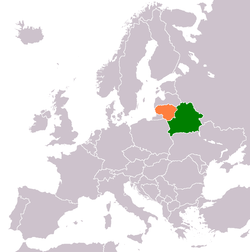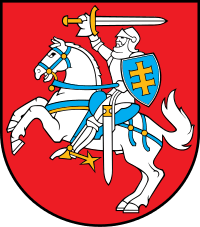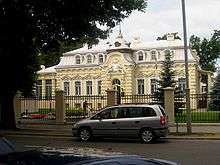Belarus–Lithuania relations
Belarusian-Lithuanian relations are foreign relations between Belarus and Lithuania. Both countries were part of the Grand Duchy of Lithuania (later merged with the Polish-Lithuanian Commonwealth), the Russian Empire and ultimately, the Soviet Union. The countries established diplomatic relations on 24 October 1991, shortly after the dissolution of the Soviet Union. The two countries share 680 kilometres (420 mi) of common border.
 | |
Belarus |
Lithuania |
|---|---|
History
On 20 December 1991, the Supreme Council of Lithuania recognized the independence of Belarus, with the same happening vice-versa seven days later. On 30 December 1992, an agreement on diplomatic relations was signed in Minsk.[1] The Belarus–Lithuania border is defined by a February 1995 treaty, with the ground demarcation of the border being completed in 2007.[2] Belarusian President Alexander Lukashenko made two official visits to Lithuania in 1995 and September 2009. On 27 October 2010, President Dalia Grybauskaite became the first ever Lithuanian head of state to the Belarusian capital of Minsk, as well as the second leader of a EU member nation to visit Belarus (Italian Prime Minister Silvio Berlusconi was the first).[3] In April 2020, Lithuanian President Gitanas Nausėda and Lukashenko had the first tete-a-tete conversation in 10 years.[4]
Rifts in relations
Each country hosts opposition figures for the other, with Belarus sheltering coup-leader Vladimir Uschopchik and Lithuania harboring Belarusian opposition figures. Lithuania has attempted to encourage a European orientation in Belarusian leadership, and has pursued trade deals and cooperation among law enforcement agencies. Sharing of information led to the arrest of Belarusian human-rights activist Ales Bialatski, resulting in European condemnation of both countries.[5] Following the Lukashenko government's crackdown after the disputed 2020 Belarus Presidential elections, which were widely regarded as unfree and unfair[6], Belarusian opposition candidate Svetlana Tikhanovskaya fled to Lithuania.[7] On 12 August Lithuania opened its borders to all Belarusians for humanitarian purposes due to the crackdown on protests.[8] Two days later on August 14, Lithuania became the first EU state to openly reject the legitimacy of Alexander Lukashenko as the President of Belarus. Lithuanian President Gitanas Nausėda said "We can not call mister Lukashenko legitimate because there were no free democratic elections in Belarus".[9]
Country comparison
| Coat of Arms |  |
 |
| Flag |  |
 |
| Population | 9,498,700[10] | 2,810,865[11] |
| Area | 207,595 km2 (80,155 sq mi) | 65,300 km2 (25,212 sq mi) |
| Population density | 45.8/km² (120.8/sq mi) | 43/km² (111/sq mi) |
| Capital | Minsk | Vilnius |
| Largest city | Minsk – 1,921,807 (2,101,018 metro) | Vilnius – 545,280 (805,173 metro) [12] |
| Government | Unitary presidential republic | Unitary semi-presidential republic |
| Current leaders | Alexander Lukashenko (president), Roman Golovchenko (prime minister) | Gitanas Nausėda (president), Saulius Skvernelis (prime minister) |
| Official languages | Belarusian (official state language), Russian (co-official) | Lithuanian |
| Main religions | 55.4% Christianity (48.3% Eastern Orthodoxy, 7.1% Catholic), 31.1% non-religious, 3.5% other | 81.38% Christianity (77.2% Catholic, 4.9% Orthodox), 10.1% undeclared, 6.1% non-religious, 1.67% other |
| Ethnic groups | 83.7% Belarusians, 8.3% Russians, 3.1% Poles, 1.7% Ukrainians, 3.2% other | 86.7% Lithuanians, 5.6% Poles, 4.8% Russians, 1.3% Belarusians, 0.7% Ukrainians, 0.9% other[13] |
| GDP (nominal) | $53 billion ($5,745 per capita)[14] | $51.372 billion ($18,312 per capita) |
| GDP (PPP) | $176 billion ($19,198 per capita) | $95.591 billion ($34,074 per capita) [15] |
Resident diplomatic missions

External links
- Belarusian embassy in Vilnius
- Lithuanian Ministry of Foreign affairs: list of bilateral treaties with Poland (in Lithuanian only)
- Lithuanian embassy in Minsk (in Lithuanian and Russian only)
- Lithuanian general consulate in Hrodna (in Lithuanian and Russian only)
- Diena.lt -- Prezidentė Dalia Grybauskaitė Minske 2010-10-20
References
- Связи Литовской Республики с Республикой Беларусь
- "The World Factbook". Retrieved 1 September 2016.
- https://www.baltictimes.com/news/articles/27230/
- https://www.lrp.lt/en/media-center/news/33998
- Eastern approaches (8 August 2011). "The snitches of Vilnius". The Economist. Retrieved 13 September 2013.
- Haboush, Joseph (2020-08-10). "Belarus elections deemed unfair by US, Germany and others; candidate missing". Al Arabiya English. Retrieved 2020-08-11.
- "Belarusian opposition leader Tikhanouskaya in Lithuania says FM". The Jerusalem Post | JPost.com. Retrieved 2020-08-11.
- "Lithuania allows unrestricted entry to Belarusians 'for humanitarian purposes'". www.baltictimes.com. Retrieved 2020-08-13.
- "Lithuanian Leader Says Lukashenko Lost Legitimacy As Belarusian President". UrduPoint. Retrieved 2020-08-14.
- "Demographic situation in 2015". Belarus Statistical Office. 27 January 2016. Archived from the original on 3 February 2016. Retrieved 27 January 2016.
- "Statistikos departamentas".
- osp.stat.gov.lt
- "Lietuvos gyventojų tautinė sudėtis 2014–2015 m". Alkas.lt. Retrieved 6 October 2017.
- "Belarus". International Monetary Fund. 2017. Retrieved 26 October 2017.
- "Lithuania". International Monetary Fund. 2017. Retrieved 27 October 2017.